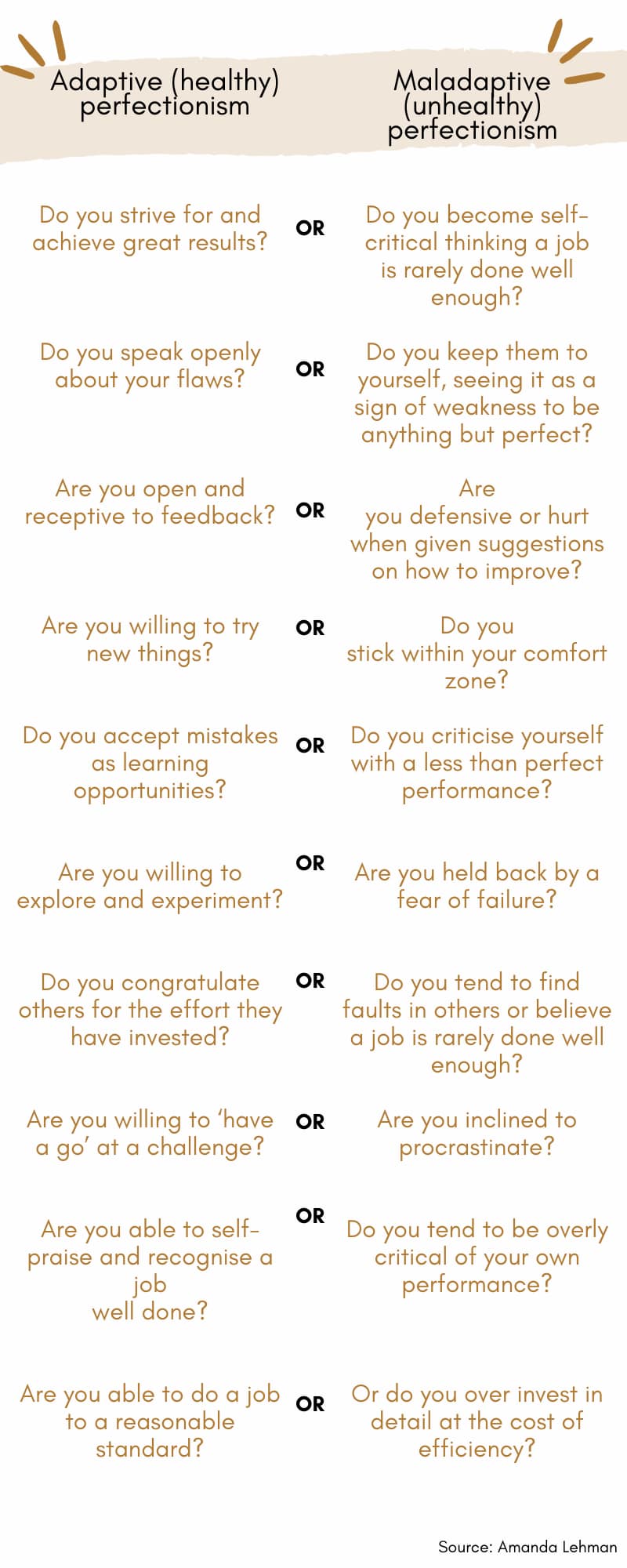Striving for perfection often manifests as self-motivation, being organised and endeavouring for excellence. However, what if our expectations are unrealistic? Can we really be flawless and achieve high standards in everything we do? Are there ways in which perfectionism can negatively impact our mental health?
The first thing to understand is that there are two types of perfectionism: adaptive and maladaptive.
What is adaptive (helpful) perfectionism?
Adaptive perfectionism may be associated with strength, such as self-drive, determination and a willingness to push ourselves towards high standards. Healthy perfectionism in other words, allows us to be highly productive, organised and able to manage high expectations.
What is maladaptive (unhelpful) perfectionism?
Maladaptive perfectionism, however, may result in unhealthy levels of perfectionism, including setting unrealistic expectations, excessive listing making or over checking. Maladaptive perfectionism can also come in the form of being critical of ourselves and others, spending more and more time on work and/or neglecting self-care and relationships. As a result, we can be left feeling inadequate, tense or frustrated, while also negatively impacting performance and relationships. Unhealthy perfectionism has therefore been linked to increased incidence of stress, anxiety and depression.
Is your perfectionism helpful or unhelpful?
The most accurate way to determine whether your perfectionism is adaptive (helpful) or maladaptive (unhelpful) is to discuss your concerns with a psychologist. However, you can perform an initial self-assessment to shed some light on your perfectionism. To do so, you could ask yourself the following questions.

If you have recognised maladaptive (or unhealthy) elements of your perfectionism that may be causing increased tension, stress or symptoms associated with anxiety or depression, you are not alone. Constantly putting pressure on ourselves in pursuit of unrealistic expectations can be tiring and lead to increased tension. Inevitably falling short or making mistakes along the way can also be very uncomfortable when we have such high expectations on ourselves.
If you feel this way, it might be time to start practicing some self-compassion.
Self-compassion: a useful way to balance unhealthy perfectionism
While some elements of perfectionism can serve us well, one antidote to unhealthy perfectionism is self-compassion. In fact, lower levels of anxiety and depression have been found in people with higher levels of self-compassion.
We know that compassion is the capacity to display empathy, kindness and concern to others, especially during difficult times. Self-compassion therefore, is to show this same kindness, acceptance and reassurance to ourselves in response to our own perceived inadequacies, mistakes or suffering.
To reflect on your self-compassion, ask yourself:
- How does your self-talk compare to the way you would speak to a friend or loved one if they were facing the same pressures, mistakes or challenges you are?
- Are you as kind, encouraging, reassuring and accepting of yourself as you would be your friends and loved ones?
3 ways to activate your self-compassion
Self-compassion may not come easily for everyone. Just like learning a new skill or changing your perspective on an issue, altering the way you see and treat yourself can take some practice.
Practice self-kindness rather than self-judgment
Understand and accept when you feel inadequate or when you suffer, rather than being critical of yourself. For example, treat yourself like a friend or a loved one and give yourself a break when you make a mistake.
Remember common humanity rather than isolation
Recognise that mistakes, pain and suffering are experienced by all human beings. If you can realise that you are not alone, you may be able to face these things with increased self-compassion and acceptance rather than frustration and a sense of isolation.
Practice mindfulness
This allows you to be aware of and accept feelings of failure without self-criticism, therefore you are neither ignoring nor exaggerating feelings of failure.
Need more help developing your self-compassion?
While it may feel awkward at first, self-compassion is something that comes more easily with time. In addition to being aware of our self-talk, we can also practice self-compassion through meditation. There are many self-compassion meditations available online. This audio meditation from self-compassion.org is just one that you might like to try.
Below is a loving kindness script which you may like to read out loud, say to yourself or write down on a regular basis:

About the author of this article: Amanda Lehman (BAPsych(Hons), Post Grad Dip Psych, Dip Ed.) is a supportive and encouraging psychologist who believes in positive and preventative psychology. Amanda works primarily within the Acceptance and Commitment Therapy (ACT) and Cognitive Behavioural Therapy (CBT) frameworks. In sessions with clients, she also uses mindfulness, motivational interviewing and coaching. With this combined approach, she empowers her clients to develop a greater understanding of their thoughts, feelings, behaviour and impact on others.
You may also like to read:
